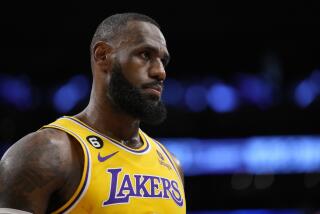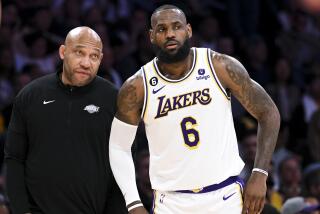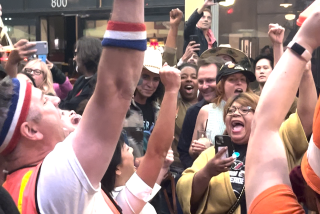The NBA lockout has begun, and so has the posturing
- Share via
Oh, no, am I here all alone?
Actually, the world didn’t end when the NBA locked its players out.
The NBA didn’t even end, even if it felt as if was about to as darkness moved across the land.
I have nothing against doomsday scenarios ... but if that’s all that’s out there, something had better be coming to an end, or it’s just the media chasing its tail again.
With months of this idiocy left, let’s see how close we can come to some actual perspective:
Who’s pushing this, owners or players?
The owners, seeking a monster giveback. Before this they would fight for six months over 5%. The owners started this seeking 14%.
How about the players breaking faith with the fans?
Not.
For all the flak players inevitably get, because they’re the ones living out fans’ dreams, they’re not asking for a single thing and have accepted the fact they’ll take a cut ... just not the one the owners have in mind.
So the owners are wrong?
Not wrong, just overboard.
Half the NBA has always had to operate too close to the blade.
Of course, it’s not just the players’ responsibility, with the owners sharing a token $45 million, to baseball’s $450 million.
Have the owners abandoned the NBA’s tradition of labor peace?
Not by themselves, they haven’t.
This isn’t the mine owners cracking down on the United Mine Workers.
In the 1998 lockout, a.k.a. “The Agents Strike Back,” it was the union, dominated by David Falk with Billy Hunter new on the job, that was bonkers.
Eight stars — most Falk clients — then took home 15% of the players’ share, with Michael Jordan at $30 million in salary when the cap was $30 million ... the equivalent of $58 million today, with a $58-million cap.
Falk packed the union board with clients (Patrick Ewing, Alonzo Mourning, Dikembe Mutombo, Juwan Howard) who opposed capping salaries while increasing minimums, in a heroic defense of high-end players (themselves).
Said Ewing of low-end players: “They make a lot of money but they spend a lot of money too.”
Only an 11th-hour uprising by the rank-and-file enabled Hunter to make a deal in the early hours of Jan. 6, hours before the owners were to vote on shutting down.
The New York Times’ Murray Chass, whose frame of reference was the baseball players’ union, then torched Hunter, who had just helped save the season.
Why lock players out for show, with no revenue or salary at risk for months?
To avoid losing revenue and salary, which would really upset everyone.
Now they have three months to torture each other, make a deal and climb aboard their golden goose.
What if they just kept talking?
The later it went, the more leverage would tilt to the players.
In 1994, Commissioner Bud Selig started the baseball season without a bargaining agreement.
In August, the union struck, giving the owners a choice between caving or losing the postseason.
The owners lost their postseason, but haven’t messed with the union since, leaving them the only major U.S. league without a salary cap and payrolls ranging from the Yankees’ $202 million to the Royals’ $36 million.
Why not split the difference now, as they’re likely to whenever this ends?
Both sides think the other will crack.
What next?
More pretend bargaining sessions, before breaking off for a month or so.
The real action will be elsewhere, in the NFL, which will have an impact.
If the NFL starts on time, there will be pressure on the NBA to do it too, or look like an unruly kindergarten.
If not, the NBA has perfect cover.
Players, seeking relief through the National Labor Relations Board, could also decertify and file an antitrust suit as NFL players did, after which NFL owners dropped their attitude and their 18-game schedule.
On the other hand, there’s Twitter, the modern challenge to union solidarity.
Shane Battier, the NBA player most likely to be elected to high office, just tweeted up a storm, begging the league to come back and talk.
Joking or not, it wasn’t the united-forever image the union wants.
Of course, Battier, a free agent, wants to get past this to see if he still has a career.
Did the lockout have the impact the NBA wanted?
If media reaction meant anything, the players would have given up.
Fans were advised to “say goodbye to the short-lived new golden era” as the NBA shows “the NFL how to conduct a truly contentious labor war” that makes 1998 “look like a summer stroll.”
I’ve thought all along Stern, the Mozart of labor relations who raised the curtain on this opera years ago, will extract what he needs from players and owners in the last act, dressed as a fat lady wearing a Viking helmet.
Maybe they miss a month.
If not, what can Stern — or I — say but ... oops!
More to Read
Go beyond the scoreboard
Get the latest on L.A.'s teams in the daily Sports Report newsletter.
You may occasionally receive promotional content from the Los Angeles Times.










